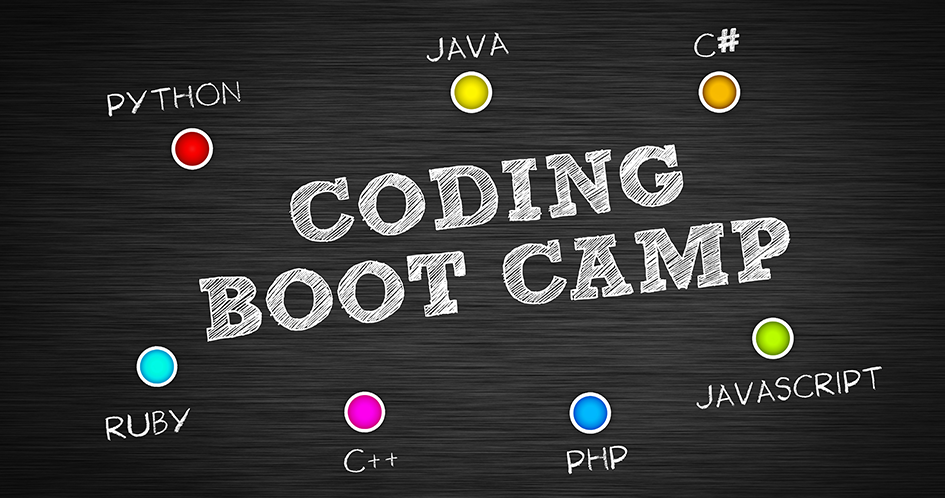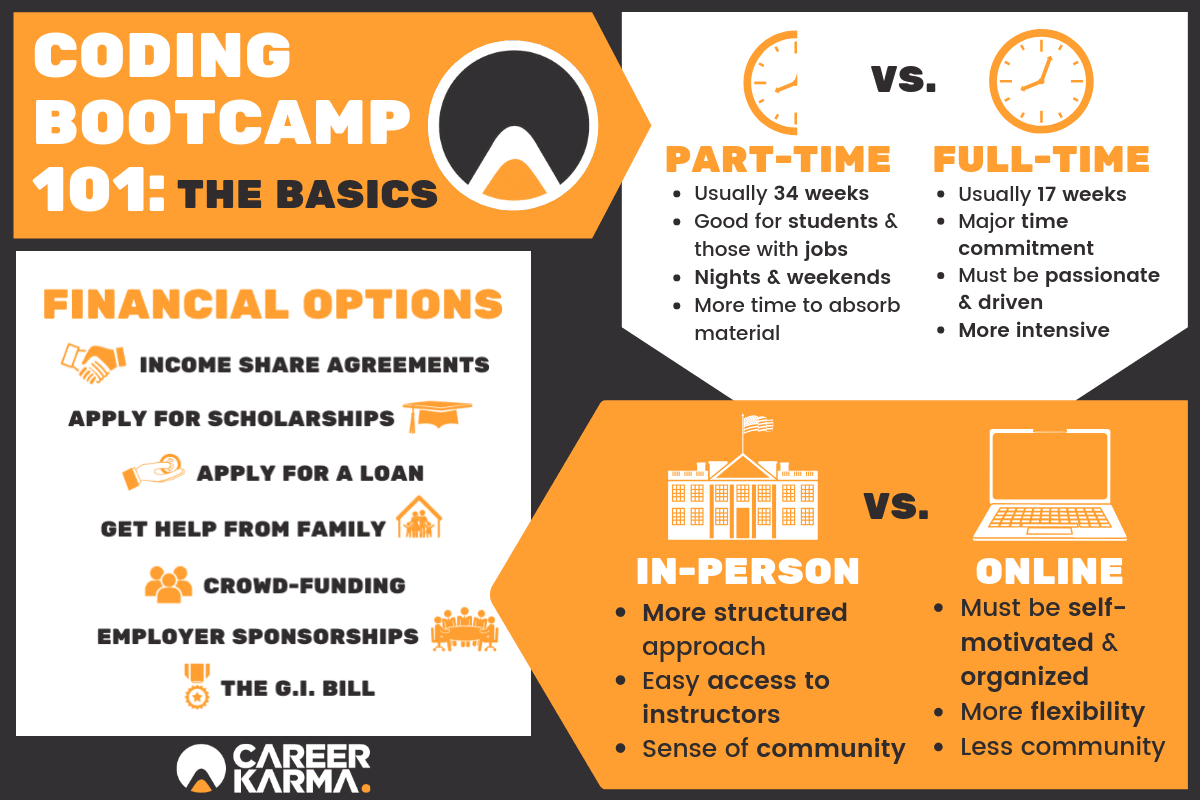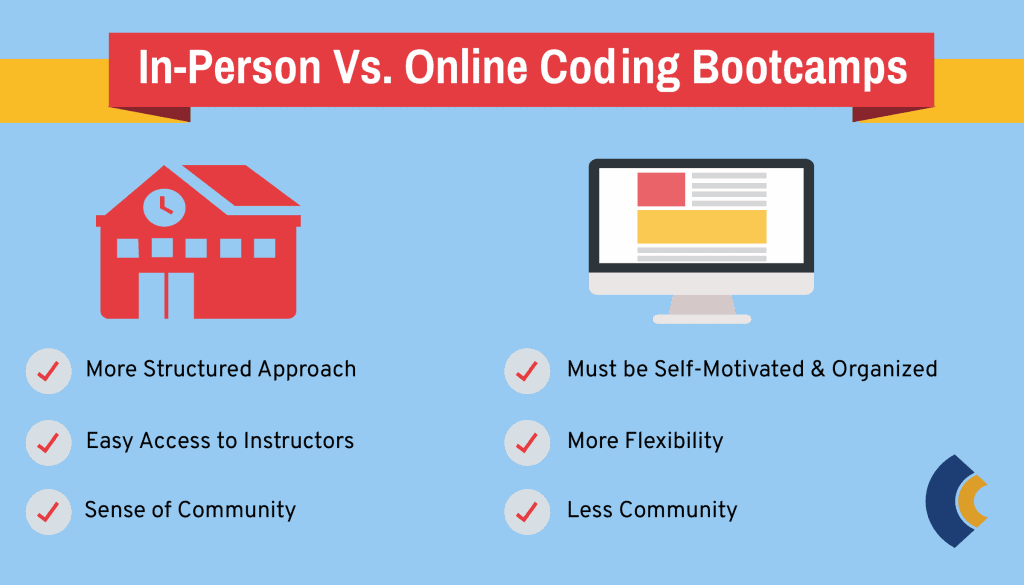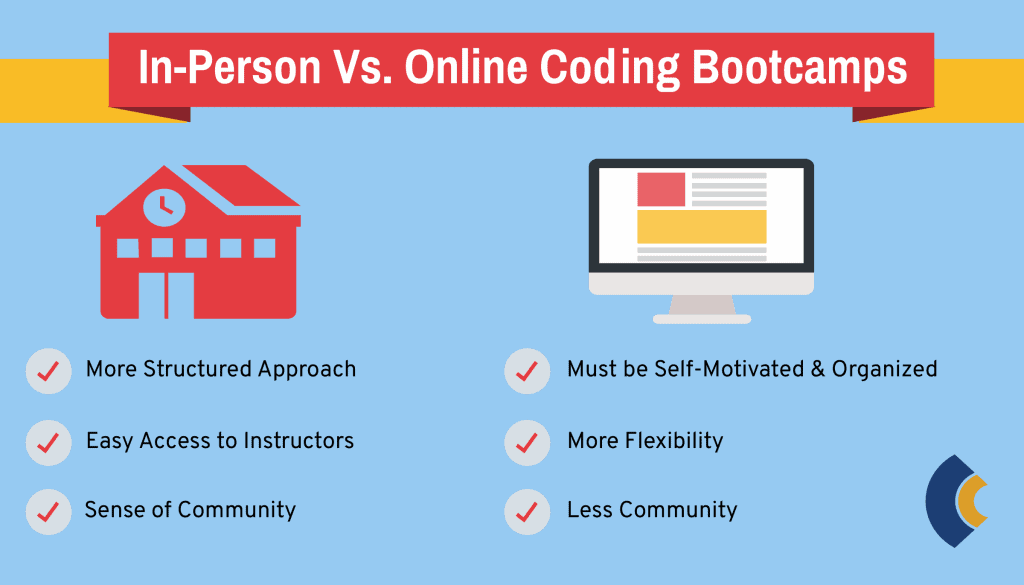What is a Coding Bootcamp?

Coding bootcamps are intensive, short-term training programs designed to equip students with the practical skills needed to launch a career in software development or a related tech field. They offer a fast-paced, hands-on learning experience, focusing on practical application rather than extensive theoretical knowledge.
Bootcamp Duration
Coding bootcamps typically range in duration from 3 to 6 months, although some programs may be shorter or longer depending on the specific curriculum and specialization. This compressed timeframe allows students to quickly acquire in-demand skills and enter the job market relatively rapidly. For example, a full-stack bootcamp might last 6 months, while a front-end specialization might be completed in 3.
Types of Coding Bootcamps
Coding bootcamps cater to a variety of career interests within the tech industry. Some of the most common specializations include:
- Full-Stack Development: This comprehensive program covers both front-end (user interface) and back-end (server-side logic) development, providing a broad skillset for building complete web applications. Students learn multiple languages and frameworks, gaining a holistic understanding of the software development lifecycle.
- Front-End Development: This specialization focuses on the user interface and user experience aspects of web development. Students learn languages like HTML, CSS, and JavaScript, along with frameworks like React, Angular, or Vue.js, to create visually appealing and interactive websites.
- Back-End Development: This track focuses on the server-side logic and database management of web applications. Students learn server-side languages like Python, Node.js, Ruby on Rails, and database technologies like SQL and NoSQL, mastering the behind-the-scenes workings of web applications.
- Data Science: These bootcamps equip students with the skills to analyze and interpret large datasets. Curricula typically include programming languages like Python or R, statistical analysis techniques, and machine learning algorithms, preparing graduates for roles in data analysis, machine learning engineering, or data science.
Coding Bootcamps vs. Traditional Computer Science Degrees
Coding bootcamps and traditional computer science degrees differ significantly in their approach, duration, and cost. While a computer science degree offers a broader, more theoretical foundation in computer science principles, bootcamps provide focused, practical training in specific technologies. Bootcamps are significantly shorter and less expensive, making them an attractive alternative for those seeking a quicker path to a tech career. However, a computer science degree often leads to more advanced roles and potentially higher earning potential in the long term.
Cost, Duration, and Career Outcomes Comparison
| Bootcamp Type | Typical Duration (months) | Typical Cost (USD) | Potential Career Paths |
|---|---|---|---|
| Full-Stack Development | 3-6 | 10,000-15,000 | Web Developer, Software Engineer, Full-Stack Engineer |
| Front-End Development | 3-4 | 8,000-12,000 | Front-End Developer, UI Developer, UX Developer |
| Back-End Development | 3-5 | 9,000-14,000 | Back-End Developer, API Developer, Database Administrator |
| Data Science | 4-6 | 12,000-18,000 | Data Scientist, Data Analyst, Machine Learning Engineer |
Curriculum and Learning Methods

Coding bootcamps offer intensive, immersive programs designed to equip students with the practical skills needed to launch a career in software development. The curriculum is structured to rapidly deliver in-demand skills, often prioritizing hands-on experience over extensive theoretical study. This fast-paced approach contrasts sharply with traditional computer science degrees, which tend to be more comprehensive and theoretical.
The curriculum typically covers a range of topics, carefully selected to provide a strong foundation in software development and prepare graduates for entry-level roles.
Curriculum Structure and Content
Bootcamp curricula vary depending on the specific program and specialization (e.g., web development, data science, cybersecurity), but common themes emerge. Most bootcamps begin with foundational computer science concepts such as data structures and algorithms, object-oriented programming, and version control using Git. This foundation is then built upon with more specialized skills related to the chosen track. For instance, a web development bootcamp might cover HTML, CSS, JavaScript, and a backend framework like Node.js or Python/Django, while a data science bootcamp might focus on Python, SQL, data visualization libraries, and machine learning techniques. The intensity of the curriculum requires a significant time commitment from students, typically involving many hours of study and project work per week.
Key Programming Languages and Technologies
The programming languages and technologies taught in bootcamps are heavily influenced by current industry demand. Popular choices include:
- JavaScript: A cornerstone of front-end web development, often paired with frameworks like React, Angular, or Vue.js.
- Python: Widely used in data science, machine learning, and backend development, often used with frameworks like Django or Flask.
- Java: A robust, platform-independent language used in enterprise applications and Android development.
- HTML, CSS: Fundamental web technologies for structuring and styling web pages.
- SQL: Essential for working with relational databases.
- C#: Used extensively in game development and enterprise applications.
- Ruby on Rails: A popular framework for building web applications.
Beyond specific languages, bootcamps also typically cover essential tools and technologies such as version control systems (Git), databases (SQL, NoSQL), cloud platforms (AWS, Azure, Google Cloud), and testing frameworks.
Teaching Methodologies
Coding bootcamps employ a variety of teaching methodologies to maximize learning and skill development. The emphasis is consistently on hands-on, practical application.
- Project-Based Learning: Students work on real-world projects throughout the program, applying newly acquired knowledge to build functional applications and solve realistic problems. This is often the core of the learning experience.
- Pair Programming: Students often work in pairs, taking turns coding and reviewing each other’s work. This collaborative approach fosters learning, problem-solving, and code review skills.
- Instructor-Led Lectures and Workshops: While hands-on learning is central, bootcamps also incorporate lectures and workshops to introduce new concepts and provide guidance.
- Mentorship and Support: Many bootcamps provide access to mentors or teaching assistants who can offer personalized guidance and support.
Hands-on Projects and Real-World Applications
The inclusion of hands-on projects is not merely supplementary; it is the core of the bootcamp experience. These projects serve as a crucial bridge between theoretical knowledge and practical application, allowing students to solidify their understanding and build a portfolio of demonstrable skills. The projects are designed to mimic real-world scenarios, pushing students to problem-solve, collaborate, and manage their time effectively.
Examples of Common Projects
Students often undertake projects that demonstrate a wide range of skills. Examples include:
- Building a fully functional e-commerce website.
- Developing a mobile application (Android or iOS).
- Creating a data analysis application that visualizes and interprets large datasets.
- Building a web application with a user authentication system and database integration.
- Developing a game using a game engine like Unity or Unreal Engine.
Admission Requirements and Selection Process: What Is A Bootcamp Coding
Gaining admission to a coding bootcamp involves a multi-step process designed to assess a candidate’s aptitude, motivation, and preparedness for the intensive learning environment. While specific requirements vary between institutions, a common thread emphasizes demonstrating a foundational understanding of technology and a commitment to the program.
The application process typically begins with submitting an application form, often online. This form usually requests personal information, educational background, work experience (if any), and reasons for pursuing a coding bootcamp. Many bootcamps also require a submission of a resume or CV highlighting relevant skills and experiences.
Application Requirements
Coding bootcamps typically require applicants to meet several criteria before acceptance. These requirements aim to ensure that students have the necessary foundational knowledge and the personal qualities to succeed in the program’s demanding curriculum. Common requirements include a high school diploma or GED, though some bootcamps may accept applicants without a formal high school degree based on demonstrated skills and experience. Many programs also require a certain level of technical proficiency, often assessed through a coding challenge or technical interview. Finally, a strong personal statement articulating the applicant’s goals and motivation is often a key component of the application.
The Application Process
The application process itself varies across bootcamps, but a common sequence involves submitting an application form, completing any required assessments (technical or otherwise), and participating in an interview. The application form typically requests personal information, educational background, work experience, and reasons for applying. Applicants should expect to provide evidence of their technical skills, often through coding challenges or portfolio submissions. The subsequent interview aims to assess the applicant’s personality, learning style, and overall suitability for the program. The entire process, from application to acceptance, can typically range from a few weeks to several months.
Interviews and Assessments
Interviews serve as a crucial step in the selection process. They allow admissions teams to gauge an applicant’s soft skills, such as communication and problem-solving abilities, as well as their understanding of the commitment required for the intensive bootcamp curriculum. Technical assessments, frequently involving coding challenges, evaluate the applicant’s existing programming skills and problem-solving capabilities. These assessments help determine whether the applicant possesses the foundational knowledge to thrive in the program. The weight given to interviews and assessments varies among bootcamps, with some placing greater emphasis on technical skills, while others prioritize personal qualities and motivation.
Comparison of Admission Processes, What is a bootcamp coding
Different bootcamps adopt diverse admission strategies. Some bootcamps might focus primarily on technical skills, requiring applicants to pass rigorous coding tests and demonstrate advanced proficiency in specific programming languages. Others may prioritize personal qualities and potential, offering more flexibility in their admission requirements. Some bootcamps offer rolling admissions, accepting students throughout the year, while others have specific application deadlines. The cost of the bootcamp itself also plays a role, with more prestigious or specialized programs often having more stringent admission criteria. Ultimately, the specific requirements and selection process should be carefully reviewed on each bootcamp’s website.
Typical Application Process Flowchart
The typical application process can be visualized as follows: Applicant submits application → Bootcamp reviews application and assesses qualifications → Applicant completes assessments (coding challenges, etc.) → Applicant participates in an interview → Bootcamp makes admission decision → Applicant accepts or declines offer.
Choosing the Right Bootcamp

Selecting the right coding bootcamp is a crucial decision that can significantly impact your career trajectory. A well-chosen bootcamp provides focused training, valuable networking opportunities, and ultimately, increased job prospects. Conversely, a poorly chosen bootcamp can lead to wasted time and money. Careful consideration of several key factors is essential to make an informed choice.
What is a bootcamp coding – The process of choosing a bootcamp involves a thorough evaluation of various aspects, from curriculum design and teaching methodologies to career services and overall cost. A systematic approach, incorporating research, comparison, and self-reflection, will help you identify the bootcamp that best aligns with your individual learning style, career aspirations, and financial resources.
Key Factors to Consider When Selecting a Coding Bootcamp
Several critical factors influence the effectiveness and suitability of a coding bootcamp. Understanding these factors empowers you to make a more informed decision, ensuring the bootcamp aligns with your needs and expectations.
- Curriculum and Focus: Evaluate the specific technologies taught, ensuring they align with your career goals. Does the curriculum cover front-end, back-end, full-stack development, data science, or another area? Look for a detailed curriculum Artikel, not just a general description.
- Teaching Methodology and Instructor Expertise: Inquire about the teaching style (project-based, lecture-based, etc.) and the instructors’ experience and qualifications. A strong teaching methodology and experienced instructors are crucial for effective learning.
- Career Services and Job Placement Support: Investigate the bootcamp’s career services, including job placement assistance, networking opportunities, and alumni networks. A robust career services program significantly increases your chances of securing a job after graduation.
- Cost and Financing Options: Compare the total cost of the bootcamp, including tuition, fees, and living expenses. Explore available financing options, such as scholarships, loans, or payment plans.
- Location and Learning Format: Consider whether you prefer an in-person, online, or hybrid learning environment. Location may also be a factor, depending on your preferences and commute.
- Student Reviews and Testimonials: Read reviews and testimonials from past students to gain insights into their experiences. Look for both positive and negative feedback to get a balanced perspective.
Checklist of Questions to Ask Potential Bootcamps
Asking direct questions to potential bootcamps allows you to gather specific information and assess their suitability. This proactive approach helps you to make a well-informed decision.
- What specific technologies are covered in the curriculum?
- What is the teaching methodology and the instructors’ background?
- What career services are offered, and what is the job placement rate?
- What is the total cost of the bootcamp, and what financing options are available?
- What is the learning format (in-person, online, hybrid)?
- Can I speak to current students or alumni?
- What is the bootcamp’s graduation rate?
Researching and Evaluating Different Bootcamps
A systematic approach to researching and evaluating bootcamps involves comparing different options based on specific criteria. This process ensures a thorough understanding of each bootcamp’s strengths and weaknesses.
- Create a Spreadsheet: Organize your research by creating a spreadsheet comparing bootcamps across key factors (curriculum, cost, location, career services, etc.).
- Visit Websites and Social Media: Explore bootcamp websites, read blogs, and check social media for reviews and testimonials.
- Attend Information Sessions: Attend online or in-person information sessions to learn more about the bootcamp’s curriculum, teaching style, and career services.
- Talk to Current Students and Alumni: Reach out to current students and alumni to gather firsthand accounts of their experiences.
Comparing Bootcamp Features and Benefits
Direct comparison of bootcamps based on specific criteria helps you to identify the best fit for your individual needs and preferences. This structured approach allows for a more informed decision-making process.
| Bootcamp | Curriculum Focus | Cost | Career Services | Student Reviews |
|---|---|---|---|---|
| Bootcamp A | Full-Stack Web Development | $12,000 | Strong job placement assistance | Mostly positive |
| Bootcamp B | Data Science | $15,000 | Limited career services | Mixed reviews |
| Bootcamp C | Front-End Development | $10,000 | Good networking opportunities | Positive |
Note: This is a simplified example. Real-world comparisons would require more detailed information.
A Systematic Approach to Bootcamp Selection
A structured approach ensures you consider all relevant factors and select a bootcamp that aligns with your goals and circumstances.
- Define your career goals: What specific technology or area of development are you interested in?
- Set a budget: How much can you afford to spend on a bootcamp?
- Research bootcamps: Use online resources and attend information sessions.
- Compare bootcamps: Create a spreadsheet to compare key factors.
- Talk to current students and alumni: Get firsthand accounts of their experiences.
- Make your decision: Choose the bootcamp that best aligns with your goals and circumstances.


Tim Redaksi